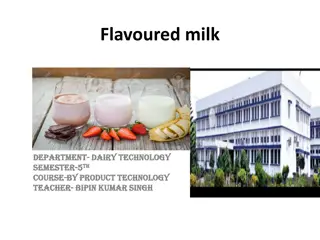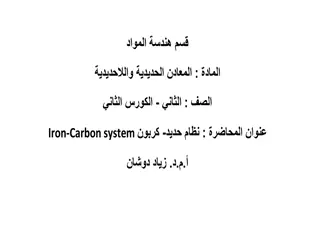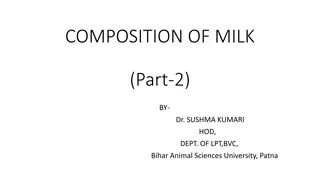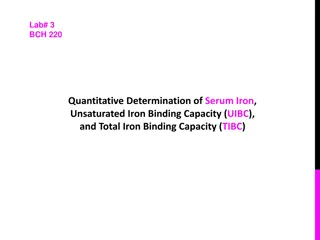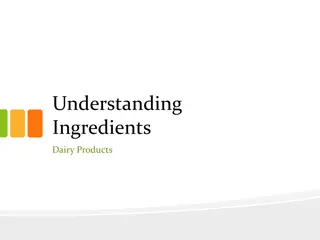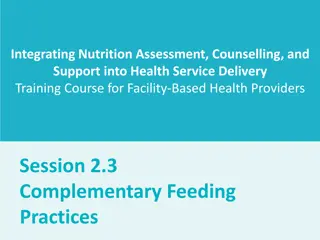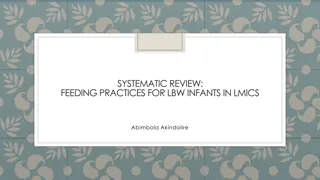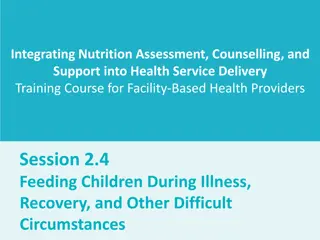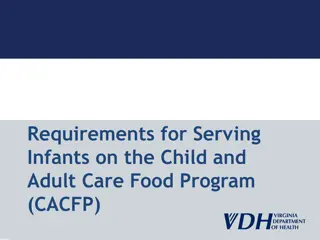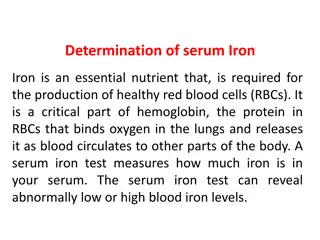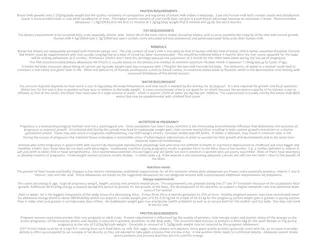Importance of Feeding Infants with Breast Milk and Iron-Fortified Formula
Breast milk and iron-fortified infant formula are recommended for infants to meet their nutritional needs and support optimal development. Breast milk offers numerous health benefits, protecting infants from illnesses and reducing the risk of obesity. Iron-fortified formula is a suitable alternative but doesn't provide the same level of protection as breast milk. Avoid fruit juice and inappropriate milk substitutes to prevent health risks, and follow safe feeding practices to prevent tooth decay and other issues associated with bottle feeding.
Download Presentation

Please find below an Image/Link to download the presentation.
The content on the website is provided AS IS for your information and personal use only. It may not be sold, licensed, or shared on other websites without obtaining consent from the author. Download presentation by click this link. If you encounter any issues during the download, it is possible that the publisher has removed the file from their server.
E N D
Presentation Transcript
These: Breast milk Iron-fortified infant formula, including soy- based formula D r i n k Instead of These: Fruit juice Cow s milk, lactose-free milk or nutritionally equivalent nondairy beverages such as soy or rice milk for infants less than 12 months (unless medically necessary) 2
Breast milk: Meets all nutritional needs of an infant and promotes health and development Protects infants from many illnesses and diseases including diarrhea, respiratory disease, SIDS, allergies and ear infections Reduces the risk of childhood obesity Is associated with improved mental development 3
Iron-fortified infant formula: Is an acceptable alternative to breast milk and is specially formulated to have the right balance of nutrients Includes iron which is a very important nutrient during the first year Does not protect infants against illness and disease as well as breast milk 4
Fruit juice: Provides less nutrients and fiber than whole baby food fruits and vegetables because of what is lost when juice is processed Drinking too much may be linked to becoming overweight or obese and is associated with tooth decay and diarrhea Cow, lactose-free, soy and rice milk do not contain the right amounts of nutrients infants need and can harm their health 5
How to feed with a bottle Hold baby & bottle during feeding Why propping a bottle is not allowed Choking, suffocation, ear infections, tooth decay, less cuddling & human contact Do not let baby carry bottle around Tooth decay, drink too much, share bottles, liquid spoil, glass bottle can break 6
Baby bottle tooth decay or early childhood caries caused by: Babies with teeth fall asleep with bottle in mouth Babies who drink from bottle (or sippy cup) with juice, sweet liquid, formula for long periods 7
To prevent tooth decay: Feed only breastmilk or formula from a bottle No juice in bottle, only in cup; do not feed more than 4 ounces of juice/day Bottle only at feeding time, not naps No bottles in crib, playpen, no propping If pacifier, only plain, nothing on it Do not use cold bottle of juice for teething pain Do not let baby carry around sippy cup 8
To prevent tooth decay (continued) No water with honey, sugar, or corn syrup, soda, sweet iced tea, juice drinks, or other sweet drinks in bottle or cup Do not feed sweet or sticky foods Gradually shift bottle feedings to cup feedings between 6 and 12 months Discuss cleaning baby s teeth/gums with parents/providers 9
Do not introduce solid food and fruit juice before 4-6 months because it may lead to: a decrease in the intake of breast milk or formula choking, digestive problems, food allergies or intolerances 10
Do not wait to introduce solid foods later than 6 months because it may lead to: the inability to accept different food textures reduced motor development (e.g. chewing) decreased nutrient intake 11
THESE: Iron-fortified infant cereal INSTEAD OF THESE: Commercially prepared cereal mixtures (cereal with fruit) Low-iron infant cereals Cereals designed for older children and adults Sweetened grains/baked goods for breakfast (e.g. donuts, cinnamon rolls, toaster pastries, muffins) Cereals that present choking hazards
Offer a variety of baby food fruits and vegetables including: Commercially prepared baby fruits and vegetables Fresh or frozen fruits and vegetables Canned fruits in their natural juices or water Canned vegetables with no added salt 13
Must list vegetable or fruit as first ingredient Plain vegetables and fruits 14
Not creditable Cereals, desserts, puddings listing fruit as the first ingredient Fruit or vegetable listing water as the first ingredient 15
Avoid vegetables high in nitrates until 6 months: Beets, carrots, collard greens, spinach, turnips 16
Offer lean protein sources such as ground well-cooked lean beef, pork, skinless chicken and turkey, fish, legumes (e.g. cooked dry beans and peas), natural cheese, egg yolk 17
Do Not Serve Processed meats such as bacon, beef jerky, bologna, hot dogs, liverwurst, pepperoni, sausage, Polish sausage Fried or pre-fried breaded meats including chicken nuggets, chicken patties, corn dogs, fish sticks Meat and meat alternates that present choking hazards or food allergies Do Not Serve 18
Not creditable: Fish Sticks Hot dogs Baby Food meat sticks Home canned meats Commercial-Prepared Combination Dinners 19
Sweeteners and Sweetened Foods: Baby Food Desserts Cakes, cookies, candy Chocolate Added sugar, syrup, etc. 20
Honey and corn syrup: either plain or in foods Artificial Sweeteners 21
The opportunities to provide young children with a healthy start are unlimited and very rewarding for parents and caregivers 22
USDA Feeding Infants http://www.fns.usda.gov/tn/resources/feeding_infants.html Ellyn Satter How to Feed Children http://www.ellynsatter.com/how-to-feed-i-24.html 23














